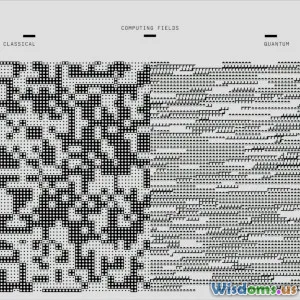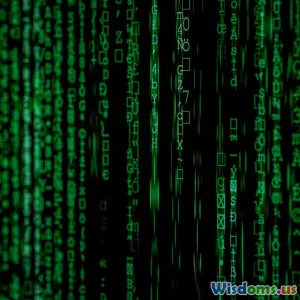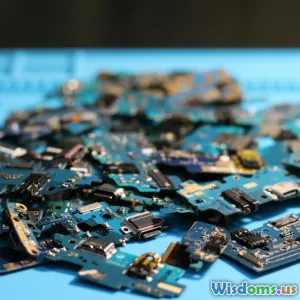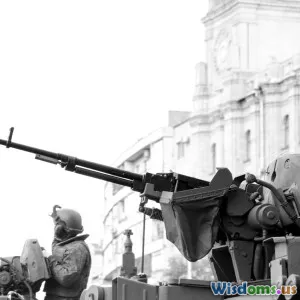
Quantum Computing and Military Applications
8 min read Explore how quantum computing is revolutionizing military applications and reshaping future warfare with unprecedented speed and security. (0 Reviews)
Quantum Computing and Military Applications: The Dawn of a New Era in Warfare
Quantum computing, often lauded as the next frontier in technological innovation, promises capabilities that can fundamentally alter the landscape of military technology and future weapons. As traditional computers hit the limits of processing speed and security vulnerabilities escalate, quantum devices offer a new paradigm for tackling some of the most pressing military challenges. This article explores how quantum computing is poised to redefine military applications, providing a strategic edge with unparalleled computational power, advanced cryptography, and real-time decision-making.
The Quantum Leap: Why Quantum Computing Matters to the Military
Unlike classical computers that use bits as fundamental units—either 0 or 1—quantum computers utilize qubits, which can exist in superposed states. This ability allows quantum systems to process massive combinations of information simultaneously. This exponential increase in processing power means quantum computers can solve complex problems beyond the reach of classical machines.
For the military, this translates into multiple key advantages:
- Breakthrough cryptanalysis and cryptography: Quantum computers can potentially crack classical encryption schemes swiftly, prompting the development of quantum-resistant protocols.
- Enhanced data processing and simulation: Quantum systems can handle complex simulations such as battlefield modeling, climate forecasting for mission planning, or materials science for developing advanced weapon systems.
- Improved Sensor Technology: Leveraging quantum principles, military sensors can dramatically improve detection, navigation, and reconnaissance.
Leading nations like the United States, China, and Russia have already invested billions in quantum research, underlining its critical role in future military competitiveness.
Quantum Cryptography: Redefining Military Communication Security
The Threat to Classical Encryption
Traditional military communications rely heavily on public-key cryptography (e.g., RSA, ECC), which currently safeguard sensitive transmissions. However, the advent of quantum algorithms such as Shor's algorithm poses an existential threat by enabling rapid factorization of large numbers — the backbone of these encryption methods.
Quantum Key Distribution (QKD)
Quantum Key Distribution offers a solution grounded in quantum physics rather than computational hardness. Protocols like BB84 allow two parties to generate a shared secret key with provable security guaranteed by the laws of quantum mechanics. Any eavesdropping attempts cause detectable disturbances in the quantum states.
Military-grade QKD systems are already in field trials. For instance, China’s quantum satellite Micius has successfully demonstrated secure quantum communications over thousands of kilometers— a tremendous potential for global, secure military communications without interception risk.
Beyond QKD: Post-Quantum Cryptography
Alongside QKD, militaries are developing cryptographic algorithms resistant to quantum decrypting attacks. The U.S. National Institute of Standards and Technology (NIST) has advanced the standardization of post-quantum cryptography, ensuring robust security as quantum computing matures.
Quantum Computing in Strategic Simulations and Decision Making
Accelerating Complex Simulations
Battlefield scenarios involve innumerable variables: troop movements, terrain, weather, logistics, electronic warfare, and adversary actions. Classical supercomputers can simulate some scenarios but often require trade-offs in accuracy or speed.
Quantum simulators can model these with greater fidelity and unprecedented speed by exploiting quantum parallelism. For instance, simulating quantum effects in advanced materials or chemical processes for better explosives or stealth coatings becomes feasible.
Enhancing AI and Machine Learning
Combining quantum computing with AI creates hybrid systems capable of rapid data analysis and improved pattern recognition from vast intelligence and sensor data feeds. This enhances situational awareness and decision speed—crucial in modern high-velocity warfare.
Military trials indicate quantum-enhanced AI could optimize strategy and logistics, anticipate enemy movements more effectively, and manage cyber defense or offense operations with new agility.
Quantum Sensors: The Next-Generation Military Edge
Quantum sensors utilize properties such as entanglement and coherence to surpass classical device limits in precision and sensitivity. Applications include:
- Gravitational field sensors: For detecting submarines or underground tunnels.
- Quantum radar: Potentially detecting stealth aircraft that evade classical radar.
- Inertial navigation systems: Crucial when GPS signals are jammed, providing precise movement tracking without external references.
For example, DARPA’s Quantum-Assisted Sensing and Readout program is exploring sensors that could revolutionize battlefield reconnaissance and navigation.
Challenges and Ethical Considerations
Technical and Operational Hurdles
Despite its promise, quantum computing faces hurdles including error correction, qubit stability (decoherence), and scaling. For military readiness, reliable, deployable quantum devices must overcome these issues.
Moreover, integrating quantum systems into existing military infrastructure requires sophisticated frameworks for interoperability and cybersecurity.
Arms Race and Global Security
The strategic advantage quantum computing confers may trigger an arms race dynamic, pushing nations to vie for supremacy quickly. This raises ethical questions about escalation risks and global security stability.
International frameworks could be necessary to manage quantum technologies responsibly, much like nuclear arms treaties.
Conclusion: A Quantum-Enabled Future for Military Superiority
Quantum computing is not a distant theoretical dream—it is a rapidly approaching reality poised to transform military applications profoundly. From shattering existing cryptographic paradigms and enabling ultra-secure communications, to accelerating strategic simulations and introducing revolutionary sensing capabilities, quantum technologies promise to redefine the battlefield of tomorrow.
The key for military forces is to invest wisely, develop quantum hardware and software resilience, and collaborate internationally to manage risks. The beneficiaries will be those who not only master the raw computational power but also integrate quantum innovations ethically and strategically into their defense architectures.
The era of quantum-enhanced warfare is dawning; understanding and adapting to this change will determine future military dominance and global security.
Quote to reflect on: "Quantum computing could give rise to the next technological leap in battlefield superiority—it's not just about computing power, but about reshaping the very nature of warfare."
- Dr. Mircea Dinca, Quantum Technologies Expert
Rate the Post
User Reviews
Popular Posts
















